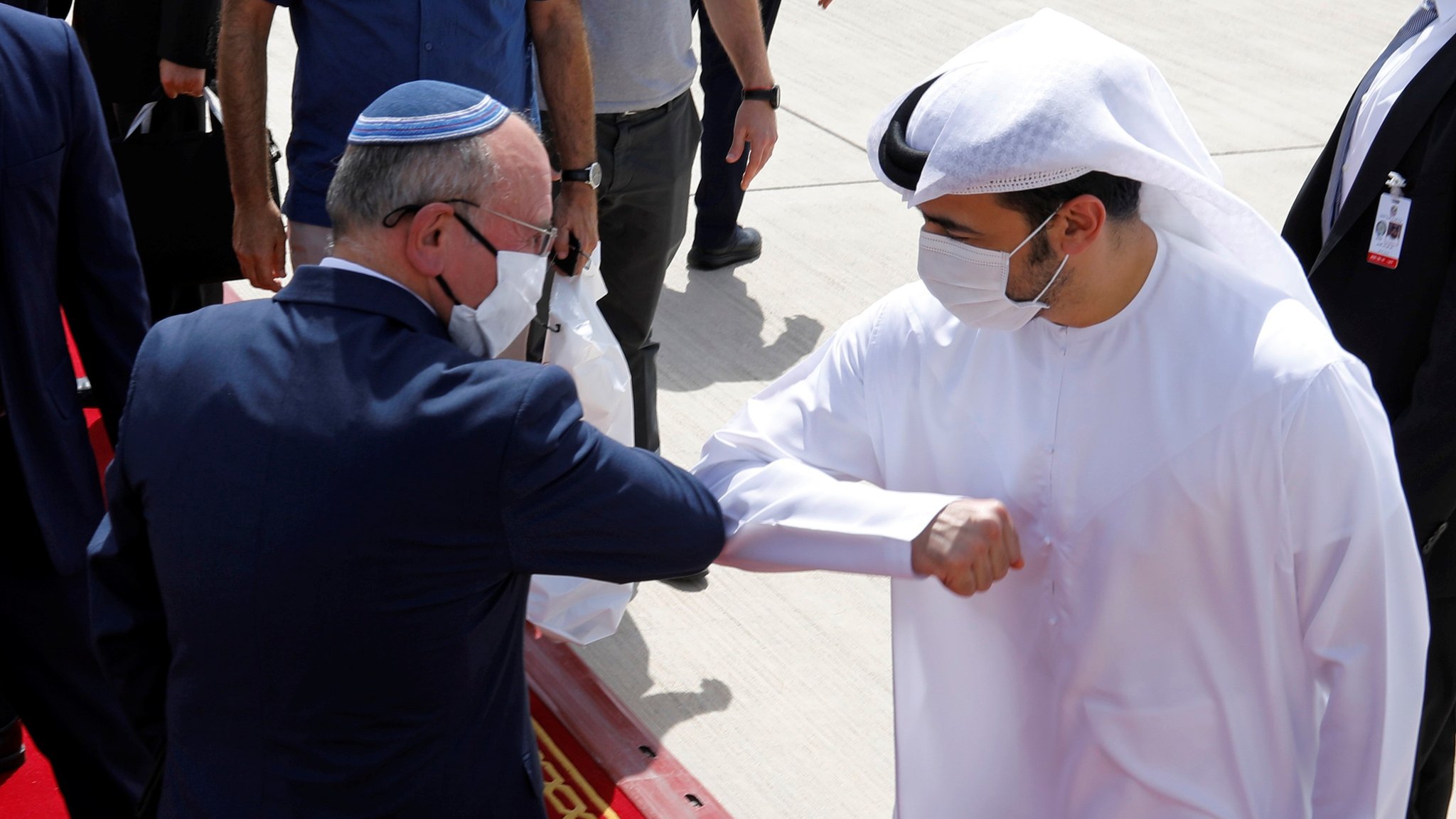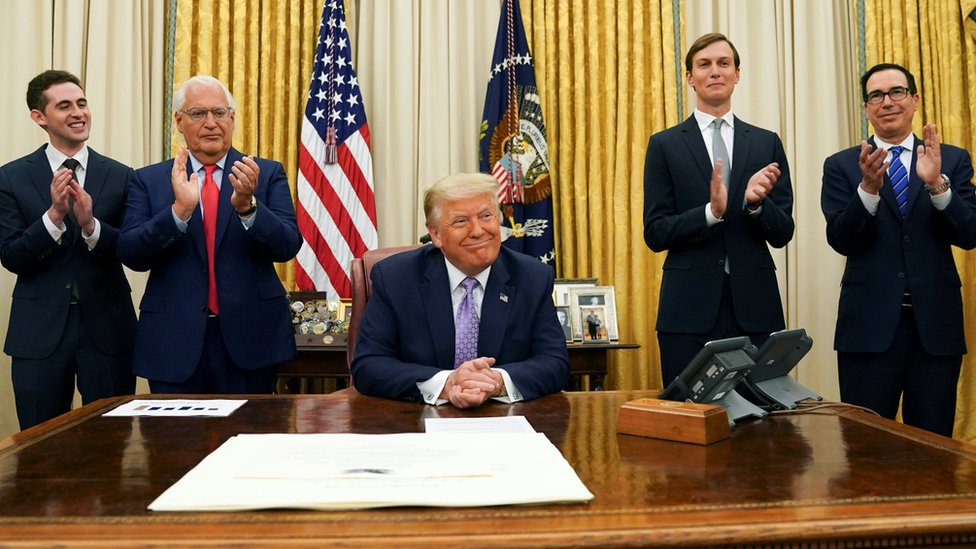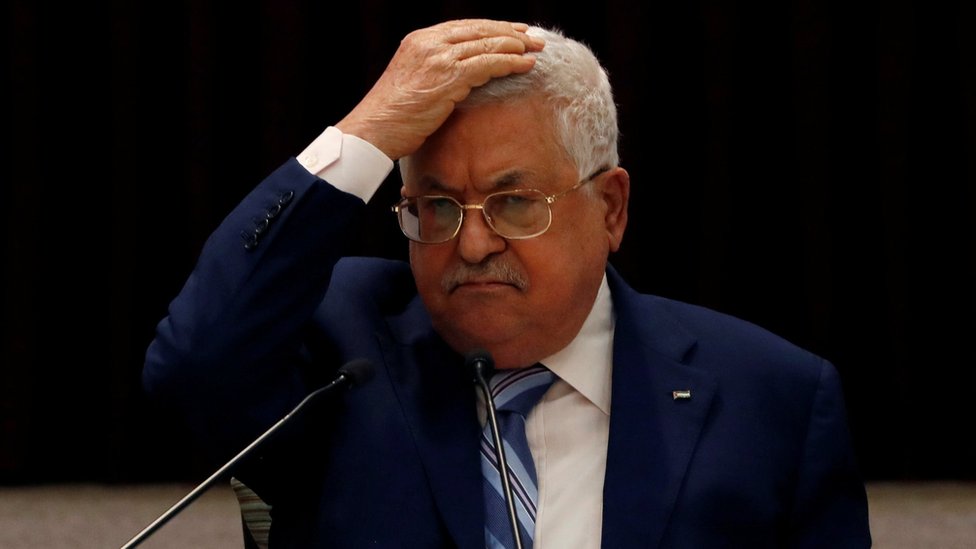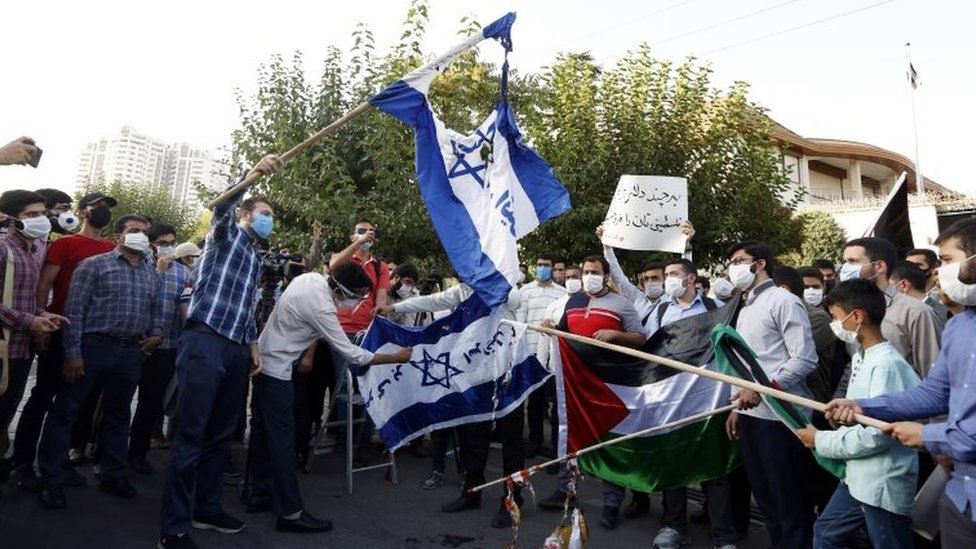--Nasir Khan
Jeremy Bowen is an experienced journalist who has covered the Middle Eastern region for long. In his latest article, he discusses the ramifications of the peace deals of Israel with the two Gulf kingdoms. Other Arab regimes may also fall in line with the ongoing process which the Trump administration started to obliterate the "Palestinian Question" once and for all as the Zionist rulers of Israel and their international supporters had demanded and worked for.
Contrary to some political observers' reactions who have downplayed the importance of these deals, Jeremy Bowen shows how they are not merely a window-dressing but substantial that would have long-term effects on the geopolitics of the whole of the Middle East.
Callously, the US imperialists have left the captive people of Palestine to the bayonets and bullets of the Israeli military machine. Where will that lead to is the question political writers and activists who stand for the UN Charter, international law and the rights of the Palestinian people should be asking.
As the Arab despots are throwing away their cloaks of hypocrisy and coming out in their true colours, the struggle of the people of Palestine for freedom and national liberation will enter a new stage.
.
https://www.bbc.com/news/world-middle-east-54151712?fbclid=IwAR3MmlODasEpkTk1UOLIzqsgUkp2y3Jaw2_3FQGyXeNNPO4n4eXLUGdW5_8
-
Five reasons why Israel's peace deals with the UAE and Bahrain matter
By Jeremy Bowen
BBC Middle East editor
- Published
 image copyrightReuters
image copyrightReutersHigh-level
delegations from Israel and the United Arab Emirates (UAE) will sign a
historic US-brokered peace deal at the White House on Tuesday.
Bahrain's
foreign minister will attend the event and sign its own agreement to
normalise relations with Israel, announced by President Donald Trump
last week.
This is why the deals are significant.
1. The Gulf states see opportunities for trade and more
The
deal helps the ambitious Emiratis, who have built themselves into a
military power as well as a place to do business or go on holiday.
It
looks as if the Americans helped seal the deal with the promise of
advanced weapons that in the past the UAE has barely been able to
window-shop. They include the F-35 stealth fighter and the EA-18G
Growler electronic warfare aircraft.
The
UAE has used its already well-equipped armed forces in Libya and Yemen.
But its most serious potential enemy is Iran, just on the other side of
the Gulf.
Israel
and the US share Emirati suspicions of the Iranians. So does Bahrain.
Until 1969 Iran used to claim Bahrain was by rights part of its
territory. Bahrain's Sunni rulers also regard sections of its restive
Shia majority as a potential fifth column for Iran.
Both
Gulf states already had barely concealed ties with Israel. They will
look forward to trading openly; Israel has one of the world's most
advanced high tech sectors.
In
non-Covid times, Israelis are avid holidaymakers who will be keen to
explore the deserts, beaches and malls of the Gulf. It is good business
all round.
2. Israel lessens its regional isolation
Normalising relations with the UAE and Bahrain is a genuine achievement for the Israelis.
Prime
Minister Benjamin Netanyahu is a believer in the strategy first
described in the 1920s of an "Iron Wall" between the Jewish state and
the Arabs.
The
idea is that Israeli strength will in the end make the Arabs realise
that their only choice is to acknowledge its existence.
Israelis
do not like being isolated in the Middle East. Peace with Egypt and
Jordan has never been warm. They might be more hopeful about future
relations with Gulf countries a long way from the cockpit of Jerusalem
and the occupied territories.
Strengthening
the alliance against Iran is another big plus. Mr Netanyahu sees Iran
as Israel's number one enemy, at times comparing its leaders to the
Nazis. He has muted his original complaints about the UAE's possible
arms deal.
Mr
Netanyahu is also beleaguered, facing a trial for corruption that might
land him in jail. His handling of the coronavirus pandemic started well
and has gone badly wrong. Opponents stage weekly rallies outside his
residence in Jerusalem.
A ceremony at the White House could not come at a better time.
3. Donald Trump celebrates a foreign policy coup
The deal works on a number of levels for the US president.
It
is a big boost for his strategy of "maximum pressure" on Iran. It is
also useful ammunition, especially in an election year, to back his
boast that he is the world's best dealmaker.
 image copyrightReuters
image copyrightReutersAnything
he does that benefits Israel, or more specifically the government of
Benjamin Netanyahu, goes down well with American Christian Evangelical
voters, an important part of his electoral base.
The
"friends of America" alliance against Iran should work more smoothly if
the Gulf Arabs can be open, rather than secretive, about their
relations with Israel.
President Trump's so-called "Deal of the Century" to make peace between Israel and the Palestinians is a non-starter.
But
the "Abraham Accords", as the Israel-UAE agreement is known, is a
significant shift in the balance of power in the Middle East and is
being presented by the Trump White House as a major foreign policy coup.
4. The Palestinians feel betrayed
Once again, they are left holding the wooden spoon.
They
have condemned the Abraham Accords as a betrayal. The new agreement
breaks a long-standing Arab consensus that the price of normal relations
with Israel was independence for the Palestinians.
But
now Israel is cementing new public relationships with Arab states while
the Palestinians still languish under occupation in East Jerusalem and
the West Bank, and in what amounts to an open prison in Gaza.
Abu
Dhabi Crown Prince Mohammed bin Zayed Al Nahyan, the UAE's de facto
ruler, says that his price for the deal was Israel's agreement to stop
the annexation of large parts of the West Bank.
 image copyrightReuters
image copyrightReutersBut
Prime Minister Netanyahu seemed to have backed away from the idea, for
now at least, because of overwhelming international pressure. The
Emiratis offered him a way out of what had become an awkward political
cul-de-sac.
The Palestinian nervousness will increase now that Bahrain has joined the agreement.
That
would never have happened without approval by Saudi Arabia. The Saudis
were the authors of the Arab peace plan that demanded Palestinian
independence.
King
Salman's status as custodian of Islam's two holiest shrines gives him
enormous authority. It is unlikely that he will suddenly recognise
Israel.
His son and heir, Mohammed bin Salman, might be less reluctant.
5. Iran has a new strategic headache
The deal has been roundly condemned by the Iranian leadership.
It is more than rhetoric. The Abraham Accords put them under extra strain.
President Trump's sanctions are already causing real economic pain. Now they have a strategic headache too.
 image copyrightEPA
image copyrightEPAIsrael's
home airbases are a long flight from Iran. The UAE's are just across
the waters of the Gulf. That would be highly significant if there was a
return to talk of air strikes against Iran's nuclear sites.
Israel, the US, Bahrain and the UAE have a range of new options.
The Iranians find their room for manoeuvre has been reduced.

No comments:
Post a Comment